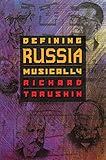Defining Russia Musically : Historical and Hermeneutical Essays / Richard Taruskin.
Material type: TextPublisher: Princeton, NJ : Princeton University Press, [2021]Copyright date: ©1997Description: 1 online resource (616 p.) : 127 music exs., 11 figures, 3 diagramsContent type:
TextPublisher: Princeton, NJ : Princeton University Press, [2021]Copyright date: ©1997Description: 1 online resource (616 p.) : 127 music exs., 11 figures, 3 diagramsContent type: - 9780691219370
- Music -- Russia -- History and criticism
- MUSIC / History & Criticism
- Abraham, Gerald
- Acocella, Joan
- Alexander III, Tsar
- Bellini, Vincenzo
- Berger, Arthur
- Bolshoy Theater (St. Petersburg)
- Brown, David
- Carter, Elliott
- Cavos, Catterino
- Dahlhaus, Carl
- Dehn, Siegfried
- Donizetti, Gaetano
- Enlightenment, aesthetic of
- Fedorov, Vladimir
- Frezzolini, Erminia
- Garafola, Lynn
- Hindemith, Paul
- Imperial Theaters
- Jahn, Otto
- Karsavin, Lev Platonovich
- Kelkel, Manfred
- Lachner, Franz
- Longyear, Rey
- MacDonald, Ian
- Mazel, Leo Abramovich
- Nietzsche, Friedrich
- Patti, Adelina
- Rossini, Gioacchino
- cold war
- criticism, formalist
- formalism
- harmonic invariance
- hermeneutics
- ideocracy
- irony
- kitsch
- naturalism
- orientalism
- pleroma
- realism
- 780.947 22
- online - DeGruyter
| Item type | Current library | Call number | URL | Status | Notes | Barcode | |
|---|---|---|---|---|---|---|---|
 eBook
eBook
|
Biblioteca "Angelicum" Pont. Univ. S.Tommaso d'Aquino Nuvola online | online - DeGruyter (Browse shelf(Opens below)) | Online access | Not for loan (Accesso limitato) | Accesso per gli utenti autorizzati / Access for authorized users | (dgr)9780691219370 |
Frontmatter -- Contents -- Others: A Mythology and a Demurrer (By Way of Preface) -- PART I. DEFINING RUSSIA MUSICALLY (SEVEN MINI-ESSAYS) -- 1. N. A. Lvov and the Folk -- 2. M. I. Glinka and the State -- 3. P. I. Chaikovsky and the Ghetto -- 4. Who Am I? (And Who Are You?) -- 5. Safe Harbors -- 6. After Everything -- 7. Objectives -- PART II. SELF AND OTHER -- 8. How the Acorn Took Root -- 9. "Entoiling the Falconet" -- 10. Italyanshchina -- PART III. HERMENEUTICS OF RUSSIAN MUSIC: FOUR CRUXES -- 11. Chaikovsky and the Human: A Centennial Essay -- 12. Scriabin and the Superhuman: A Millennial Essay -- 13. Stravinsky and the Subhuman -- 14. Shostakovich and the Inhuman -- Index
restricted access online access with authorization star
http://purl.org/coar/access_right/c_16ec
The world-renowned musicologist Richard Taruskin has devoted much of his career to helping listeners appreciate Russian and Soviet music in new and sometimes controversial ways. Defining Russia Musically represents one of his landmark achievements: here Taruskin uses music, together with history and politics, to illustrate the many ways in which Russian national identity has been constructed, both from within Russia and from the Western perspective. He contends that it is through music that the powerful myth of Russia's "national character" can best be understood. Russian art music, like Russia itself, Taruskin writes, has "always [been] tinged or tainted . with an air of alterity--sensed, exploited, bemoaned, reveled in, traded on, and defended against both from within and from without." The author's goal is to explore this assumption of otherness in an all-encompassing work that re-creates the cultural contexts of the folksong anthologies of the 1700s, the operas, symphonies, and ballets of the 1800s, the modernist masterpieces of the 1900s, and the hugely fraught but ambiguous products of the Soviet period. Taruskin begins by showing how enlightened aristocrats, reactionary romantics, and the theorists and victims of totalitarianism have variously fashioned their vision of Russian society in musical terms. He then examines how Russia as a whole shaped its identity in contrast to an "East" during the age of its imperialist expansion, and in contrast to two different musical "Wests," Germany and Italy, during the formative years of its national consciousness. The final section, expanded from a series of Christian Gauss seminars presented at Princeton in 1993, focuses on four individual composers, each characterized both as a self-consciously Russian creator and as a European, and each placed in perspective within a revealing hermeneutic scheme. In the culminating chapters--Chaikovsky and the Human, Scriabin and the Superhuman, Stravinsky and the Subhuman, and Shostakovich and the Inhuman--Taruskin offers especially thought-provoking insights, for example, on Chaikovsky's status as the "last great eighteenth-century composer" and on Stravinsky's espousal of formalism as a reactionary, literally counterrevolutionary move.
Mode of access: Internet via World Wide Web.
In English.
Description based on online resource; title from PDF title page (publisher's Web site, viewed 30. Aug 2021)


